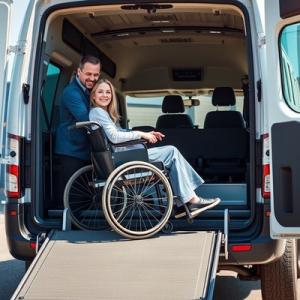Tacoma's Mobility Crisis Impacts Healthcare Access — Community Program Launches in Response
Public transit systems, while essential, often do not meet the needs of patients who require timely, accessible rides
TACOMA, WA, UNITED STATES, May 12, 2025 /EINPresswire.com/ -- In Tacoma, an often-overlooked barrier to healthcare is quietly putting lives at risk: transportation. For residents with chronic health conditions, such as kidney failure, heart disease, diabetes, and respiratory illnesses, the ability to attend regular outpatient appointments is not optional. Yet, for many, getting to those appointments safely and consistently remains a major challenge.Across the city, seniors and individuals with mobility impairments are navigating a complex system where access to care isn’t just about having insurance or seeing a doctor—it’s about the ability to travel there in the first place. And with demand for chronic care services steadily increasing, that transportation gap is becoming harder to ignore.
Transportation Delays Risk Health Outcomes
Patients undergoing dialysis three times per week are among the most vulnerable. These sessions are medically critical—missed appointments can result in hospitalization or even life-threatening complications. However, patients who use wheelchairs or require special assistance often report frequent delays or an inability to secure timely transportation.
While public transit remains a lifeline for many, its limitations, particularly for those needing medical accommodations, are evident. Standard ride-share services, though widespread, often lack the reliability and accessibility required for routine medical care. Meanwhile, family caregivers trying to juggle work, childcare, and transportation responsibilities report rising stress and burnout.
According to the National Kidney Foundation, missed dialysis appointments significantly increase the risk of death and raise long-term healthcare costs. Despite these risks, Tacoma’s transportation infrastructure has yet to meet the needs of its medically vulnerable populations fully.
A Strain on Families and an Equity Concern
Beyond physical health, the emotional and logistical toll continues to grow. Caregivers across Tacoma are stretched thin, often managing complex schedules while navigating unreliable options for getting loved ones to medical visits. For elderly residents who live alone or in care homes, the lack of accessible transport can lead to increased isolation and deteriorating quality of life.
These burdens are not felt equally. Low-income communities and communities of color, which already face health disparities, are among those most impacted. Many rely on informal networks, inconsistent options, or simply go without care, exacerbating existing inequities in healthcare access.
Local Response to a Growing Challenge
In light of these ongoing challenges, a community-based effort has emerged to help address the issue. A newly launched transportation program in Tacoma is providing scheduled, wheelchair-accessible rides for residents who require recurring medical visits, such as dialysis or therapy. The service is designed to provide consistent, pre-arranged rides, not on-demand or one-off trips, acknowledging the importance of reliability for those managing chronic conditions.
The initiative’s structure includes dedicated vehicles outfitted for mobility aids and drivers trained to support passengers with complex health needs. In addition to improving transportation logistics, the program seeks to alleviate the mounting stress on family caregivers by offering a stable alternative for medical transport.
Addressing Affordability and Continuity of Care
One key feature of the new service is a flat-rate option that allows Tacoma residents to book unlimited miles of wheelchair-accessible rides for $96. This model may offer a more predictable and sustainable transportation solution for families managing frequent medical visits, especially for low-income households that cannot afford private alternatives.
While the program is still developing, it reflects a shift in how local infrastructure is beginning to accommodate aging and chronically ill populations. The focus is not just on healthcare itself, but on the critical systems that enable access to that care.
As Tacoma continues to grapple with its growing healthcare demands, particularly among seniors and those with mobility challenges, addressing transportation is no longer optional. It’s a fundamental part of ensuring that all residents can receive timely, consistent care, regardless of physical ability, income level, or family support systems.
More information on this local transportation initiative is available at:
MRT to Showcase Fox Body Passion at Motor City Fox Fest 2025 in Dearborn, Michigan
Overhead Cranes Market to Reach $5.04 Bn, Globally, by 2027 at 4.9% CAGR: Allied Market Research
Cloud RAN Market Growing at 23.4% CAGR | Reach USD 85.9 Billion by 2031 Globally
Kalendarium
Więcej ważnych informacji
 Jedynka Newserii
Jedynka Newserii

 Jedynka Newserii
Jedynka Newserii

Prawo

Przedsiębiorcy chcą uproszczenia kontroli celno-skarbowych i podatkowych. Wskazują na potrzebę dialogu z kontrolerami
Poprawa relacji z fiskusem i urzędnikami przeprowadzającymi kontrole to jeden z najczęściej podnoszonych postulatów przez przedsiębiorców. W ramach deregulacji prowadzonej przez rząd domagają się oni większej współpracy i otwartości na wyjaśnienia ze strony organów podatkowych, jasnej interpretacji przepisów, partnerskiego traktowania oraz skrócenia procesu przedawnienia. Te zmiany mogłyby poprawić atmosferę i klimat dyskusji między przedsiębiorcami a rządem.
Bankowość
Banki zainteresowane projektami gospodarki obiegu zamkniętego. Chętniej finansują takie inwestycje

Rynek zrównoważonego finansowania rośnie. Banki stawiają na rozwój oferty zielonych instrumentów, które przedsiębiorcy i inne instytucje mogą przeznaczyć na sfinansowanie inwestycji z różnych obszarów ESG. Są wśród nich zarówno zielone obligacje, jak i kredyty połączone z realizacją konkretnych celów klimatycznych. Jednym z obszarów, które chcą finansować firmy w ramach ESG, jest gospodarka obiegu zamkniętego, czyli zamykanie obiegu produktów w myśl zasady reduce, reuse i recycle (ogranicz, użyj ponownie, przetwórz).
Handel
E-papierosy i aromatyzowane saszetki nikotynowe mogą zniknąć z rynku. Ministerstwo Zdrowia chce całkowitego zakazu ich sprzedaży

W wykazie prac legislacyjnych pojawiła się nowa propozycja Ministerstwa Zdrowia, która przewiduje zakaz wprowadzania do obrotu papierosów elektronicznych jednorazowego użytku – zarówno tych z nikotyną, jak i bez niej, oraz zakaz stosowania aromatów w woreczkach nikotynowych. Projekt trafił do konsultacji społecznych. To już kolejna regulacja sektora tytoniowego w ostatnich miesiącach. Przedstawiciele biznesu podkreślają, że to chaos regulacyjny, który wpływa na brak poczucia pewności prawnej i decyzje inwestycyjne.
Partner serwisu
Szkolenia

Akademia Newserii
Akademia Newserii to projekt, w ramach którego najlepsi polscy dziennikarze biznesowi, giełdowi oraz lifestylowi, a także szkoleniowcy z wieloletnim doświadczeniem dzielą się swoją wiedzą nt. pracy z mediami.










.gif)

 |
| |
| |
|